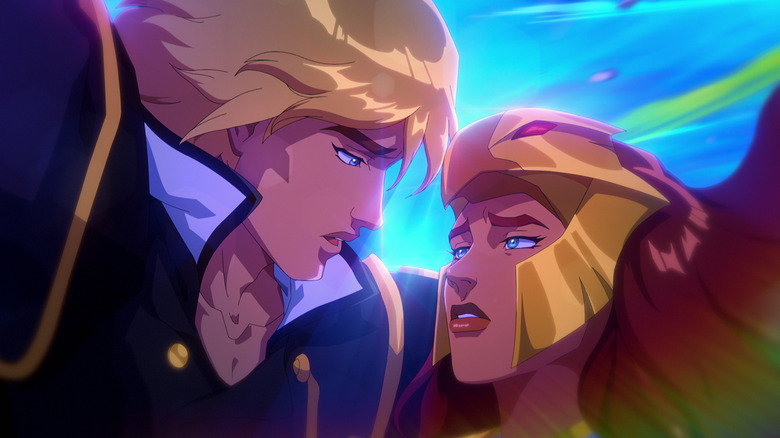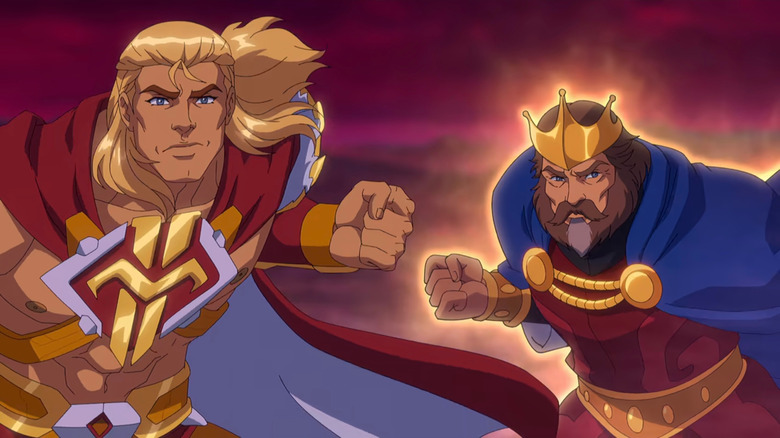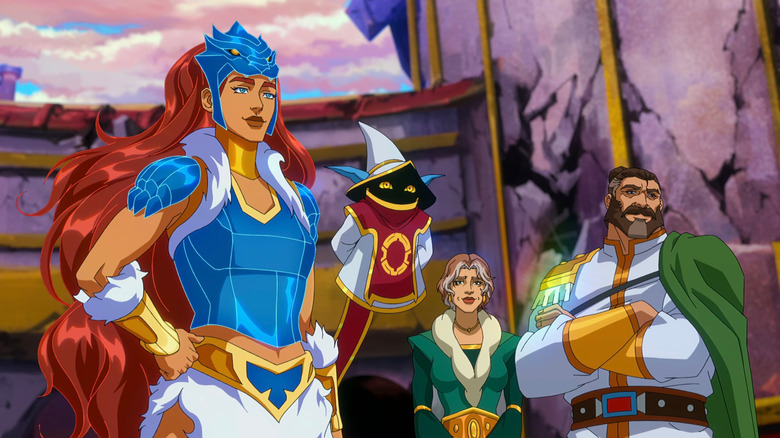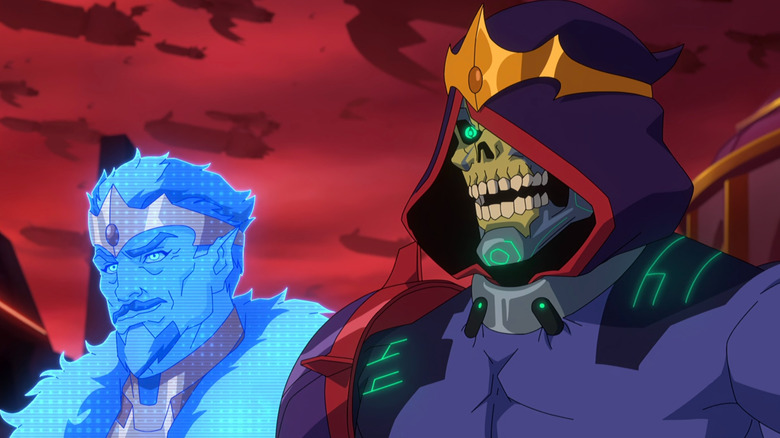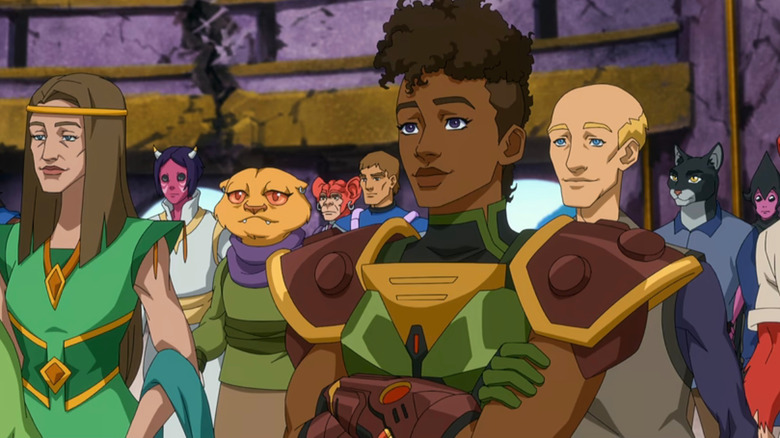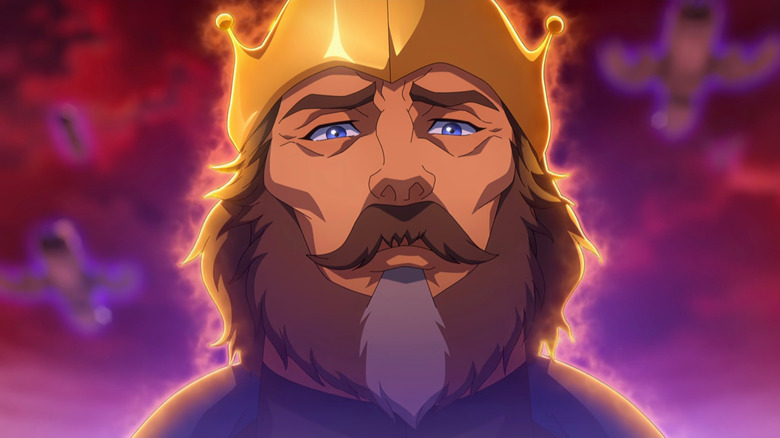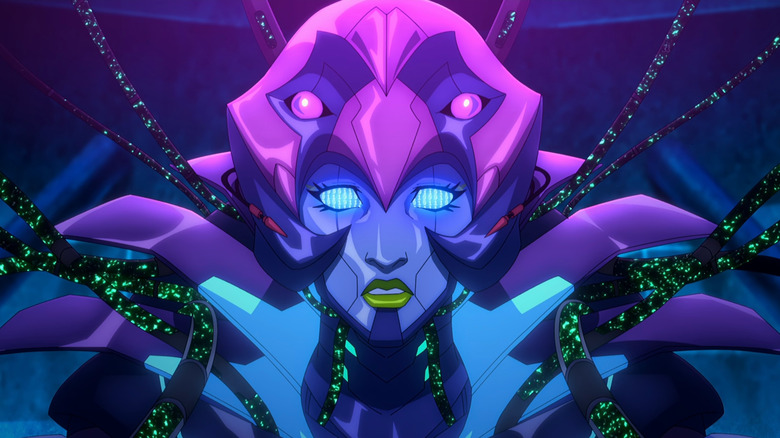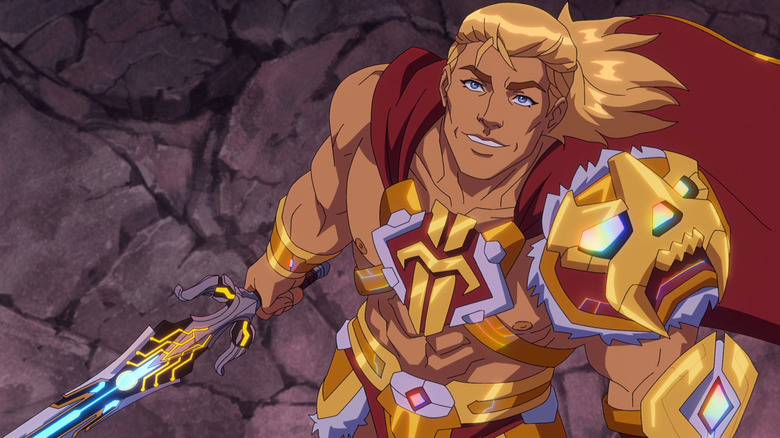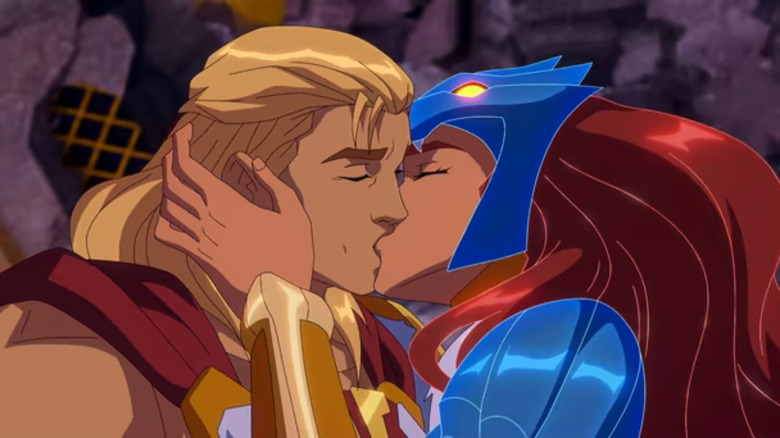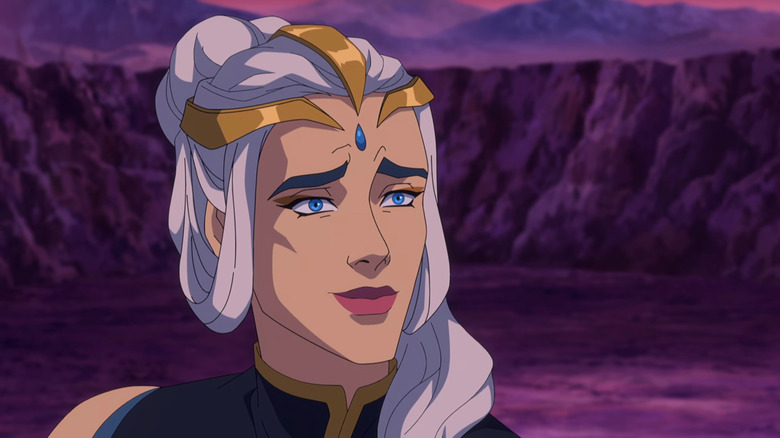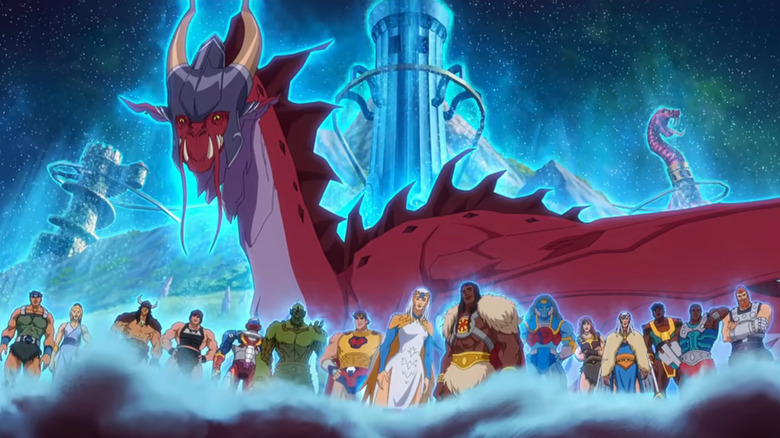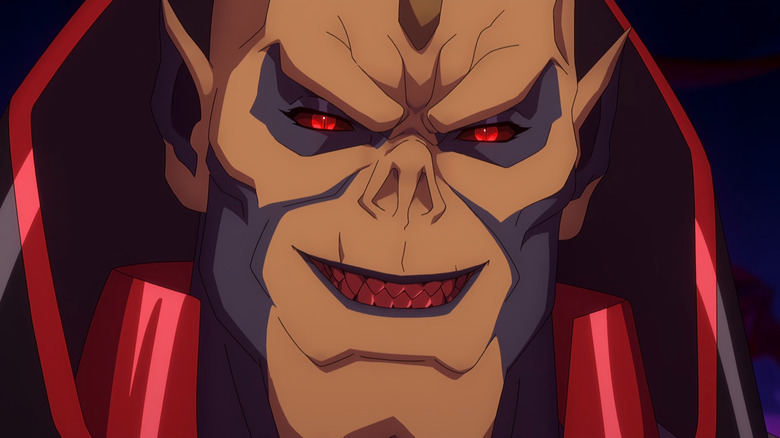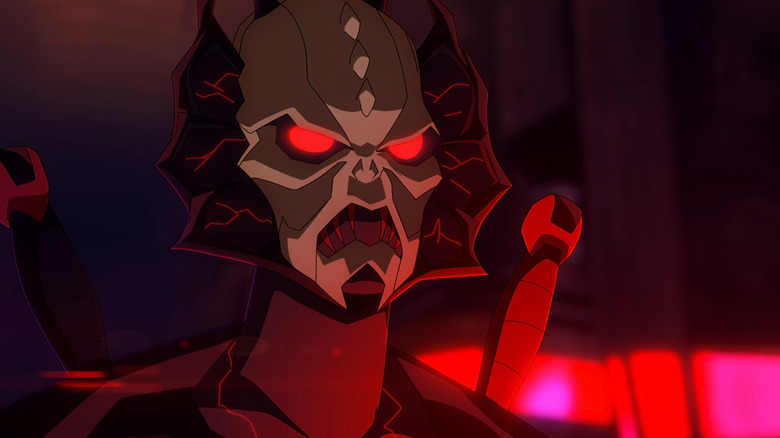The Ending Of Masters Of The Universe: Revolution Explained
"Masters of the Universe: Revelation," the 2021 revival of the '80s classic "He-Man and the Masters of the Universe," shook things up big time. Destroying Eternia's version of Valhalla, Preternia; setting Evil-Lyn (Lena Headey) up for redemption; and having Teela (Sarah Michelle Gellar) become the Sorceress of Grayskull after her predecessor, her mother Teela Na (Susan Eisenberg), is killed, are just a few of the eye-popping developments the ending of "Revelation" brought to the table.
The follow-up to "Revelation," 2024's "Masters of the Universe: Revolution," introduces even more major changes to the franchise's classic status quo. Skeletor (Mark Hamill) is gone, Randor (Diedrich Bader) has passed on, Adam (Chris Wood) and Teela (now voiced by Melissa Benoist) are dating, Lyn gets a new calling, and Eternia goes democratic — could it get any more shocking? So what does it all mean, and how might it affect the "Masters of the Universe" gang going forward? Lift those swords up high and call upon the power, because it's time to explore the ending of Netflix's "Masters of the Universe: Revolution."
What you need to remember about Masters of the Universe: Revolution
After saving the souls of Fisto and Clamp Champ from an unpleasant afterlife in Subternia, He-Man aka Prince Adam finds himself dealing with the death of his father, King Randor, from a rare organ disease. The loss leaves Adam, Randor's apparent heir, struggling to figure out how being He-Man will fit into his new kingly duties. A curve ball, however, appears in the form of Keldor (William Shatner), Randor's secret half-brother, who claims he is next in line to rule. After befriending Keldor, Adam gladly hands him the title of king.
Unbeknownst to Adam, however, Keldor is truly He-Man's archenemy Skeletor, who is conspiring with the technological being Motherboard (Meg Foster) and Skeletor's old mentor, Hordak (Keith David), to stamp out Eternian magic and finally place Eternia and its people under their control. Meanwhile, Teela, the new Sorceress, works with Evil-Lyn to bring back Eternia's paradise for heroic souls, Preternia, so that Randor's soul may live forever in peace. Doing so, however, means mastering the three magics of Eternia, thus becoming a Tri-Sorceress — a job much easier said than done, even for Teela. And if that weren't enough, love is in the air in Eternia, and its tender breeze is pushing Adam and Teela closer together.
What happens at the end of Masters of the Universe: Revolution?
While Skeletor becomes King of Eternia, He-Man's power is neutralized when Motherboard submerges Castle Grayskull in her machinery. On top of that, Skeletor's silver tongue as Keldor convinces an unsuspecting Andra (Tiffany Smith) to accidentally turn Eternians into Motherboard's willing servants. As the coup de grace, Skeletor then kills Motherboard and Hordak so he can have Eternia all for himself.
Luckily, He-Man and the gang devise a pretty effective counterattack. He-Man's Sword of Power gets the mother of all tune-ups, which Adam first uses to help Teela get her new Tri-Sorceress powers under control — an assist sealed with a kiss. After that, Adam's sword destroys Motherboard's technology with the same magic used to make Adam into He-Man. Its most shocking feat, however, is changing Skeletor back into Keldor, his true self.
The whole ordeal leaves the Eternian capital Eternos in shambles, convincing Adam that Eternia doesn't need another Keldor on the throne — or even an Adam. Thus the youthful king declares Eternia a democracy to an overwhelmingly positive response. Meanwhile, Lyn's selfless deeds earn her a place among the Cosmic Enforcers. Yet the final scene of "Revolution" suggests celebrations may be premature ... the mysterious Despara (Grey DeLisle) works to bring Hordak back to life, so that they may revive his efforts to take over Eternia.
Skeletor no more
Skeletor probably could have saved himself a lot of time and effort concocting plots if he'd known he was destined to eventually rule Eternia anyway. He-Man's old foe, now made into a cyborg by the techno-terror Motherboard, tricks Prince Adam into giving him Eternia's kingdom by assuming the appearance of Randor's half-brother and rightful heir, Keldor, with holographic technology. At first, Skeletor views "Keldor" as a mere role. Yet the cybernetic implants Motherboard has bestowed Skeletor with unlock some long-buried memories in the form of a Keldor hologram, who reveals Skeletor used to be Keldor — meaning He-Man is his literal nephew. With holo-Keldor whispering in his ear, Skeletor comes up pretty quickly in the world ... that is, until He-Man siphons away all the magic that made Keldor into Skeletor in the first place, along with Skelly's added Motherboard tech.
For now, Skeletor as we know him has ceased to exist. He's still around as Keldor, but the iconic, skull-faced appearance and power his Havoc Staff gave him have been taken away. Between that and getting locked in Grayskull's dungeon, He-Man's most enduring villain has arguably come closer than ever to an actual "ending." While there's still a chance he could become Skeletor once more, Keldor's going to have a much harder time reacquiring his Havoc Staff, especially since it's become part of Teela's Tri-Sorceress Staff. Yet Keldor's scheming mind may find a way, especially if still backed by a talkative subconscious. Tri-Sorcerer Skeletor, anyone?
By the people of Grayskull
Throughout the original "He-Man and the Masters of the Universe" series, Eternia is depicted as a traditional monarchy whose rulers are determined by bloodline. The same holds true in the first Kevin Smith series, "Masters of the Universe: Revelation" and for most of "Revolution." This doesn't bother Eternia's people much, as their sovereigns are typically noble and just. Yet choosing leaders by blood relation proves imperfect when Skeletor himself is next in line on Eternia's throne. The ensuing debacle leads He-Man to jettison the monarchy upon replacing Skeletor as king, introducing democracy to the Eternian people.
Giving Eternian citizens say in who'll lead them could even introduce more accountability for leaders who potentially break bad like Keldor, though democracies aren't immune to corruption, either. Who's to say Skeletor's ex-lackeys won't try running for office, for example? Conversely, new characters or even Eternia's heroes could do the same, with Andra, the current Man-At-Arms, already expressing interest.
Also notable, though, is who loses power when Eternia turns to democracy, namely the Eternian Royal Court. While its members don't seem to mind, this political shift begs the question of how much Eternia's incoming democratic officials will rely on He-Man and his fellow heroes for help. They may not even like our heroes much, again pitting He-Man at odds with the leader or leaders of his people. It also raises the question of what this means for Eternia's former queen, Marlena (Gates McFadden) — while He-Man seems set on moving into Castle Grayskull with Teela, Marlena's next steps remain nebulous.
A king's eternal reward
Technically, Randor is not the last Eternian king. Given that Adam's kingly tenure doesn't even last a day and Keldor's not much longer than that, however, Randor is the last king to have served a lifetime on the throne. Randor's passing in "Revolution" is a big change from the original "He-Man and the Masters of the Universe," where he was as much a stalwart presence as Queen Marlena. For the first time, both the series and modern-day Eternia lack his stable presence.
The loss carries similar repercussions for Adam and Marlena. Adam can no longer go to Randor, his father, for guidance and emotional support, while Marlena is now without her spouse and equal. Yet they can rest somewhat easier knowing Randor has found paradise in the recreated Preternia, where he will lead a pleasant afterlife for the rest of time. Randor, meanwhile, can start his stay in Preternia's Hall of Heroes with his heart at peace, having even resolved his grudges with Adam and Marlena back in "Revelation." Sadly, though, Randor won't be able to watch over his wife and son personally, as "Revelation" showed viewers that Preternians aren't really able to peek into the mortal world. Could Teela's powers let her conjure Randor's spirit once in a while so he, Adam, and Marlena can lovingly catch up?
Motherboard failure
"Revelation" introduced a looming threat to Eternian magic in its early installments, namely Motherboard and her growing number of followers. Moreover, Motherboard forcibly turned the franchise's main villain, Skeletor, into her cyborg servant, "Skeletek," in "Revelation's" last episode, making it clear that Motherboard would be a major presence in whatever action followed. Sure enough, "Revolution" delivers on that promise, showing the sinister cyber-being taking over Castle Grayskull and converting it into her techno-domain. She also works together with Skeletek in deluding Eternians into thinking Keldor is a pretty good guy and totally not Eternia's infamous Lord of Destruction in a different guise.
Yet no one said Motherboard would last the whole series. In a scene pulled right out of "Se7en," Skeletor, goaded by visions of his former self, Keldor, murders Motherboard and presents his old teacher, Hordak, with her severed head. While he mainly does it for personal gain, Skeletor also, in killing off Motherboard, has removed Eternia's greatest threat to the mystic arts. If Skeletor and Evil-Lyn showed audiences what happens when magic goes unchecked in "Revelation," Motherboard proves in "Revolution" that going too far in the other direction and smothering magic with technology isn't the right path for Eternia, either. This also means Motherboard's cult no longer has a leader to rally around, making one wonder just what the few Eternians who willingly followed her intend to do with themselves now.
He-Man's permanent tech upgrade
He-Man finds a pretty handy countermeasure against Motherboard turning people into cyborgs: his own power. Realizing the Sword of Power can't possibly loan out Grayskull magic simultaneously to that many people, He-Man asks Duncan (Liam Cunningham), the former Man-At-Arms, to find a way to amplify his sword's power-sharing range. Duncan and Orko (Griffin Newman) thus bring the sword over to master inventor Gwildor of Thenur (Ted Biaselli). Despite being fairly magic-averse, Gwildor successfully gives the sword the boost it needs.
He-Man's altered sword is not only powerful enough to destroy the tech controlling Eternia's people, but it also creates a human version of Battle Cat's (Stephen Root) transformation for Teela. Plus it gives He-Man greater strength and new powers, with brand-new armor and insignia to match. The sword can even absorb Skeletor's Havoc magic, to Keldor's great displeasure.
Since "Revelation" knocks the old "Masters of the Universe" sequel, "The New Adventures of He-Man," out of canon, this development marks the first supposedly permanent change to He-Man's suit and iconic weapon in the original "He-Man" continuity. He-Man's new upgrade resolves the magic vs. technology conflict at the heart of "Revolution" by showing that embracing both is the only way for He-Man and Eternia to move forward. As Skeletor himself aptly puts it, "This is Eternia — technology is only half the battle." It also begs the question of whether Keldor becoming Skeletor again would even be worth it, as He-Man can presumably just take his power away again.
For the love of Grayskull
Teela has been Adam's buddy and bodyguard, as well as a loyal ally to He-Man, since the very first "He-Man" television show. Yet it was suggested more than once in that series that a mutual attraction existed between the captain of the guard and the Eternian prince.
Whereas "Revelation" dropped a few more subtle teases, "Revolution," conversely, deals with Adam and Teela's feelings for each other directly. Teela's attraction to Adam and her insecurities around it are things she has to directly deal with to master the Staff of Ka's Snake Magic, with Evil-Lyn, of all people, acting as her coach. Adam, meanwhile, is at first too preoccupied with straightening out thorny issues of lineage and Motherboard attacks to focus on his lingering feelings. Yet the moment he joins Teela in completing her Tri-Sorceress training, the two finally open their hearts to one another.
Adam and Teela being an item has officially made them Eternia's biggest power couple. Furthermore, Adam moving into Grayskull with Teela and rejecting the royal crown means he won't have to divide his time between duties of state and He-Man life. Conveniently, it also saves him a trip whenever he needs Teela's direct assistance and vice versa. Who knows — perhaps the two will even marry, as they did in DC Comics' "Masters of the Universe" stories. They may never rule Eternia together as king and queen, but if they so choose, they could eventually have Children of Power.
Lyn's redemption goes cosmic
Evil-Lyn's moral compass was tricky to predict in "Masters of the Universe: Revelation." Ultimately, though, after engaging in all sorts of heinous, grand-scale deeds with the power of Grayskull, Lyn seemingly turns her back on malevolence once and for all. When she first appears in "Revolution," however, it's not entirely clear whether Evil-Lyn's truly given up the old Evil-Life. Yet her blossoming benevolence again prevails, as she not only looks after the dying dragon Granamyr (John De Lancie) and aids Teela's Tri-Sorceress training, but she also joins the heroes in sticking it to Skeletor. Impressed by her growth and her role in helping magic and tech find a middle ground in Eternia, the Cosmic Enforcers then recruit Lyn to take her benevolent streak to the spaceways.
Though she'll always add a little bit of spice and unpredictability to every scene she's in, it's clear Lyn's otherwise just about ditched the "evil" in her name once and for all. Her being inducted into the Cosmic Enforcers, led by old He-Man ally Zodac (Jeffrey Combs), implies that she can now genuinely be trusted with big responsibilities — in this case, keeping balance in the universe intact. Interestingly, Zodac and his people actually keep their involvement with mortals pretty light, other than offering useful items and vague warnings here and there. It might actually prove difficult for Lyn to adhere to their code of non-interference, given how hands-on she's traditionally been in influencing things, good and ill.
Paradise restored
When Evil-Lyn destroyed Preternia and its Hall of Heroes in "Revelation," it seemed as if the souls that populated it had gone with it. "Revolution," however, shows that Preternia's spirits remain intact, albeit adrift. Furthermore, Granamyr reveals that being neither tied to Preternia nor its crueler counterpart, Subternia, comes with a hefty price — endless wandering, followed by dissipation. Even in the "He-Man" universe, souls don't last forever unless they have a place to go.
Luckily, Teela successfully brings Preternia back. The timing is, of course, perfect for the recently departed Randor and Granamyr, as they can live truly eternal lives — something that brings inner peace to Adam, Queen Marlena, and Lyn. Yet there are other ramifications to consider. Restored with Preternia, for instance, is the realm's Grayskull Tower, home of a gate between the dead and living worlds. While Adam claims in "Revelation" that the gate only opens one way, he later uses it himself to come back to life — meaning, of course, that the realm's other inhabitants could do the same, if needed. Like Adam, however, they'd be unable to return to Preternia afterward. It might be the one chance Randor and He-Man have of being together again, however, as Randor being in Preternia means He-Man can never join him. This complication doesn't exist for Teela, though, who's guaranteed to reunite with her mother if she dies, as Teela Na now also lives in Preternia.
Hordak's imminent return
While Motherboard guides the Horde's forces in Eternia for the first half of "Revolution," she's backed by a very familiar face. Hordak, leader of the Horde army and arch-villain to He-Man's sister, She-Ra, joins Motherboard and Skeletor in their tech conquest, perhaps more terrifying than he's ever been. Despite being allied with Skeletor again, however, Hordak shows there's no love lost between them, berating his "acolyte" at every turn. Finally fed up, Skeletor turns on Hordak after beheading Motherboard, and the two engage in a fierce battle, ending with Hordak's demise.
Shockingly, though, "Revolution" shows that death is just a temporary setback for Hordak. At the series' end, a previously unseen ally, Despara, promises to revive Hordak so the two can continue the Horde's invasion of Eternia. It's a twist that raises a big question: If Hordak can be revived by technology, does that mean he's functionally immortal so long as there's a person or machine willing to bring him back? While the threat of Skeletor may have "ended" in this series, perhaps the threat of Hordak is truly never-ending.
She-Ra incoming
Much like "Revelation," the new "He-Man" series gives fans a tantalizing tease in its final scene. The ending not only promises the return of Hordak, but also the upcoming arrival of a new ally, Despara, to Eternia.
Yet this "Despara" may not be as new or unknown as some viewers might think. Despara first appears in DC Comics' 2013 "He-Man and the Masters of the Universe" comic, where it's revealed she is an alias for a longtime "Masters of the Universe" character: the champion of Etheria herself, Princess Adora aka She-Ra. Despite legal complications that previously kept He-Man and She-Ra from appearing on one another's shows, it seems pretty likely Despara will end up being Adora in the next installment of Kevin Smith's "He-Man" epic, barring some major misdirection. That means that, somehow, Hordak's had Adam's twin sister is brainwashed once more, to the point where she doesn't even remember her brother's alter ego, He-Man.
On one hand, this means things probably aren't going so well in She-Ra's adoptive planet of Etheria. What happened to her allies, her horse Swift Wind, and her Sword of Protection? On the other, the chances of Adora shaking off Hordak's latest mental manipulations and calling upon the Honor of Grayskull to become She-Ra once again seem very, very high. That said, she may find an obstacle in the form of Hordak's other top minion, Shadow Weaver, whose magic is what kept Adora under Hordak's sway in the past.
